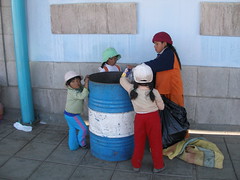Here’s the thing.
Charter schools get to dismiss any student who is not performing up to their standards.
I’ll say it again.
Charter schools get to dismiss any student who is not performing up to their standards.
Not performing academically, not performing socially, not performing behaviorally, and even if the student is doing ok, if the parents don’t perform, the student gets dismissed.
No wonder they have school-wide success at the end of every year. (Never mind those kids who were dismissed).
Look at the Kipp contract. Look at the rules for entering any charter school. In each case there are clear parent responsibilities and clear student responsibilities. That’s great, sure. But what happens when the parent or student fails to keep up to the charter school’s standards? They get tossed.
To where? Public schools of course.
Just today, we had a kid throw up in the main hallway. We had a kid so wound up he was having a melt-down in the office. Another went home to a friend’s house without telling anyone. If only we were a charter school! Boom, Boom, Boom. All three would be gone. No repeat offenders in the principal’s office. At Kipp, the parents have to be respectful of the teachers or, Boom, their kid is gone. Such a luxury.
In my school, (50%+ English as a second language, 40% special education, 76% free or reduced lunch, 40% student churn rate throughout each year, operating 47% over capacity on student registration, and too many misogynistic parents from developing nations), heck we could probably deep six about 30% of the students in a month. That would bring teacher-student ratios to a much more “successful” level. All the disruptive, don’t pay attention, parents-don’t-care kids would be gone. All the low scorers, gone, with a wave of the principal’s hand. What a dream.
Of course if you are trying to have a rational debate on national education policy, there is one bothersome little question. Where do they go when we’re all charter schools?
On the street, of course. There would be a great national underbelly of 2nd and 3rd grade drop outs. Commercials would depict them standing on street corners selling drugs.
Here’s an interesting thought. If they determine state penitentiary space needs 10 years out by the current reading scores of public school students in 3rd grade (which they do), imagine how much we’d be spending in tax dollars to build prisons? Starting immediately and not stopping.
That wouldn’t happen of course. “Ridiculous!” the charter school supporters would say, “We would just have to have a state school system for those kids.”
And then we’re back to the original discussion, about what we should do about national education policy.
Charter Schools are a non-starter for a general fix for education. They are just state sponsored private schools for anyone who can make them work.


